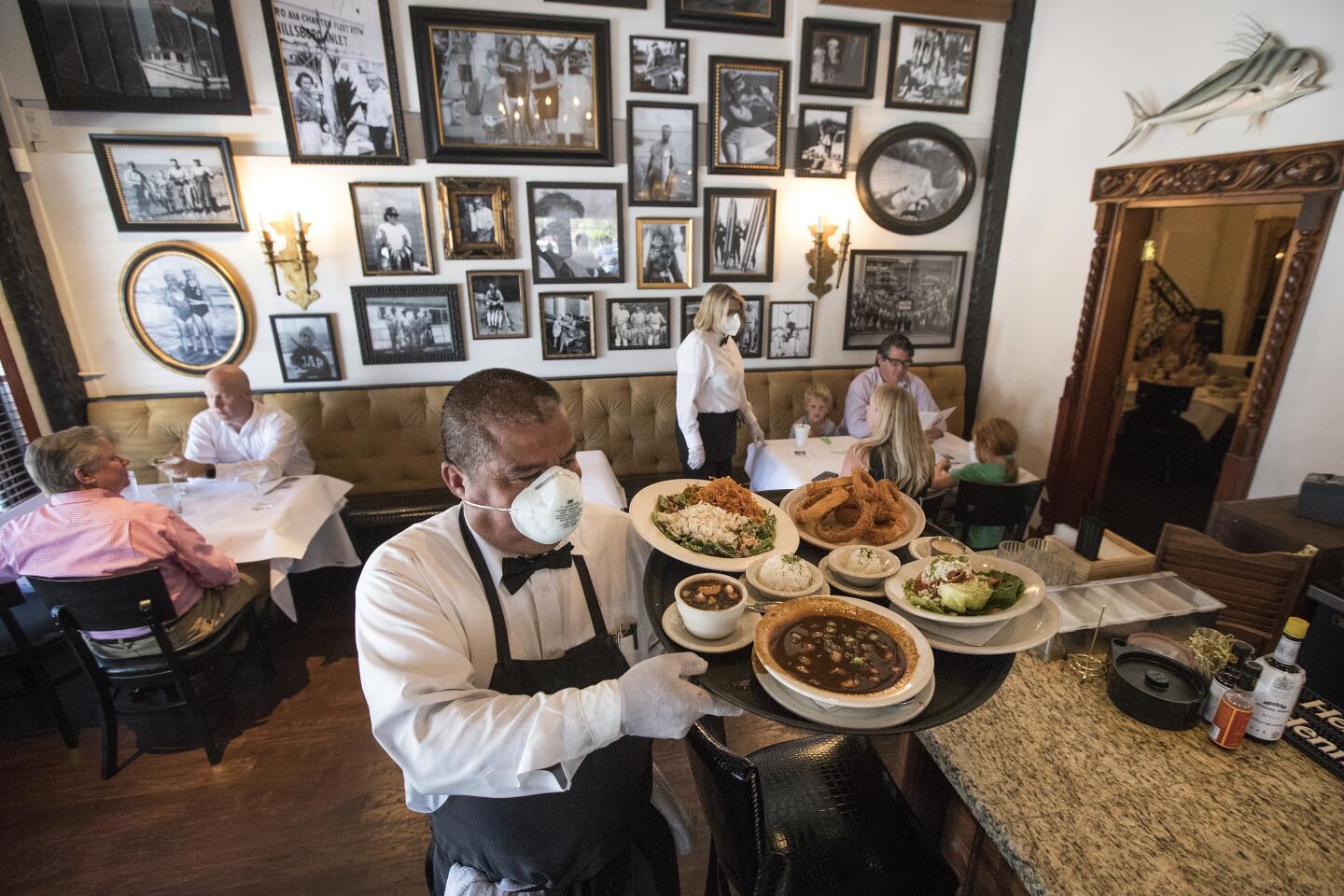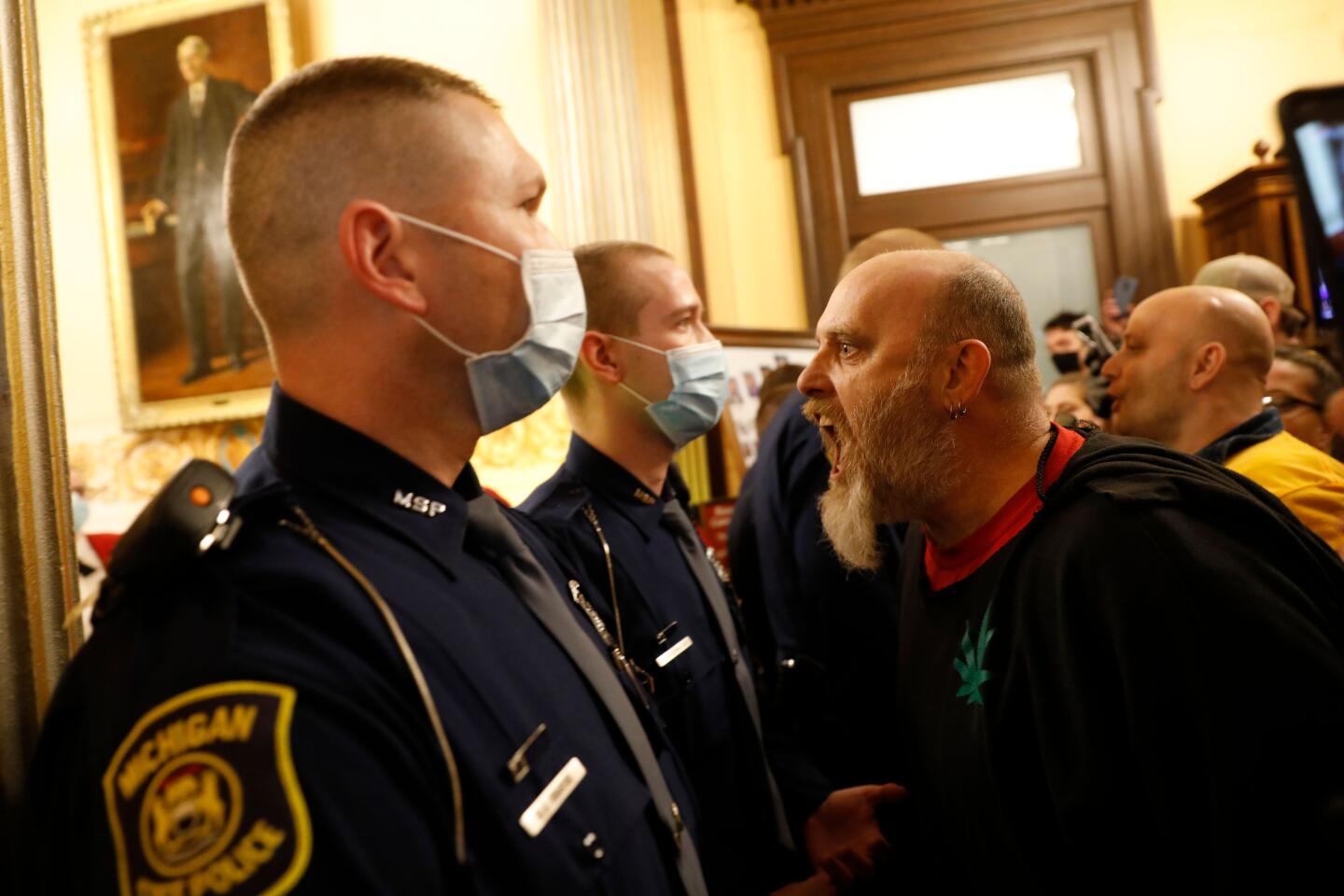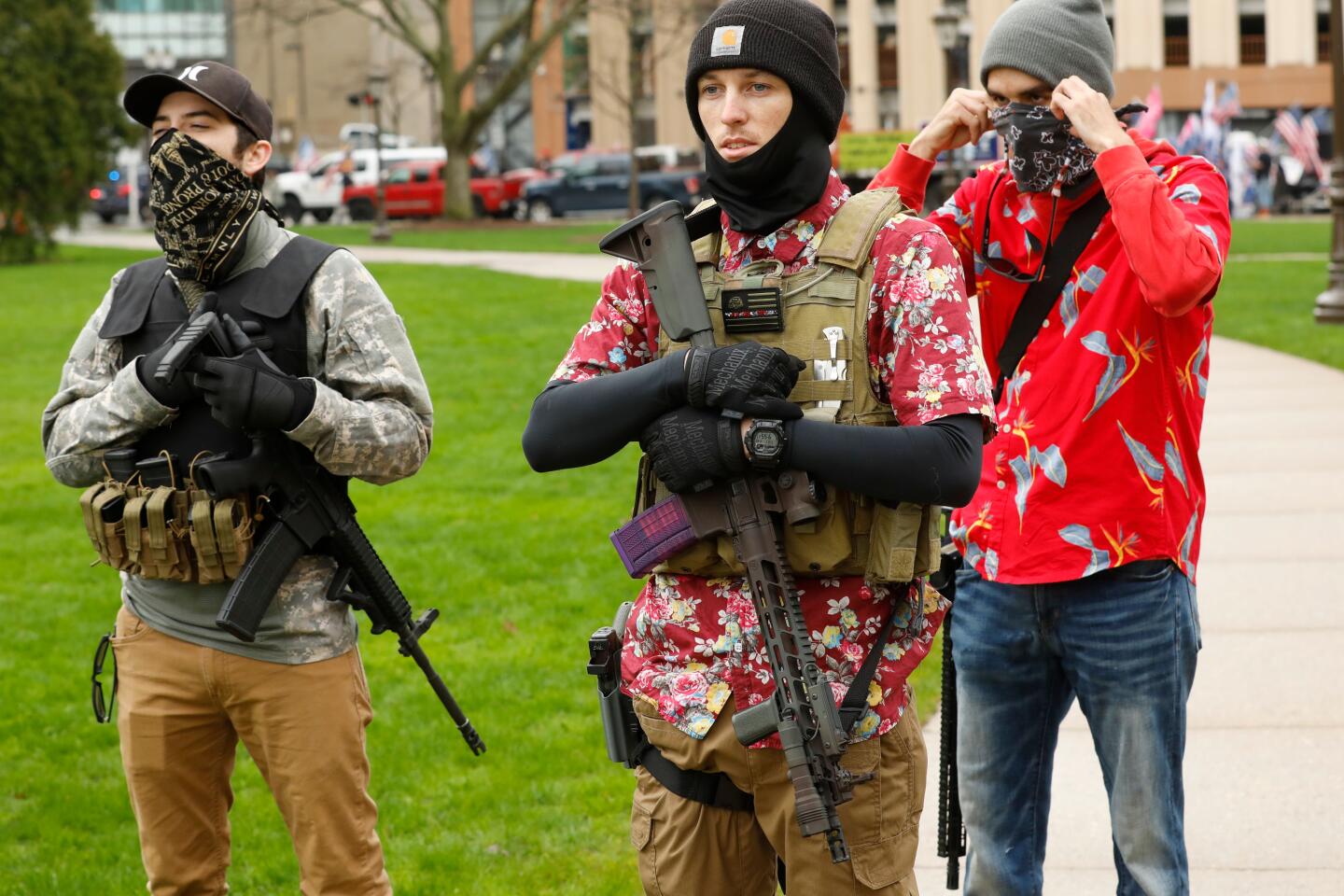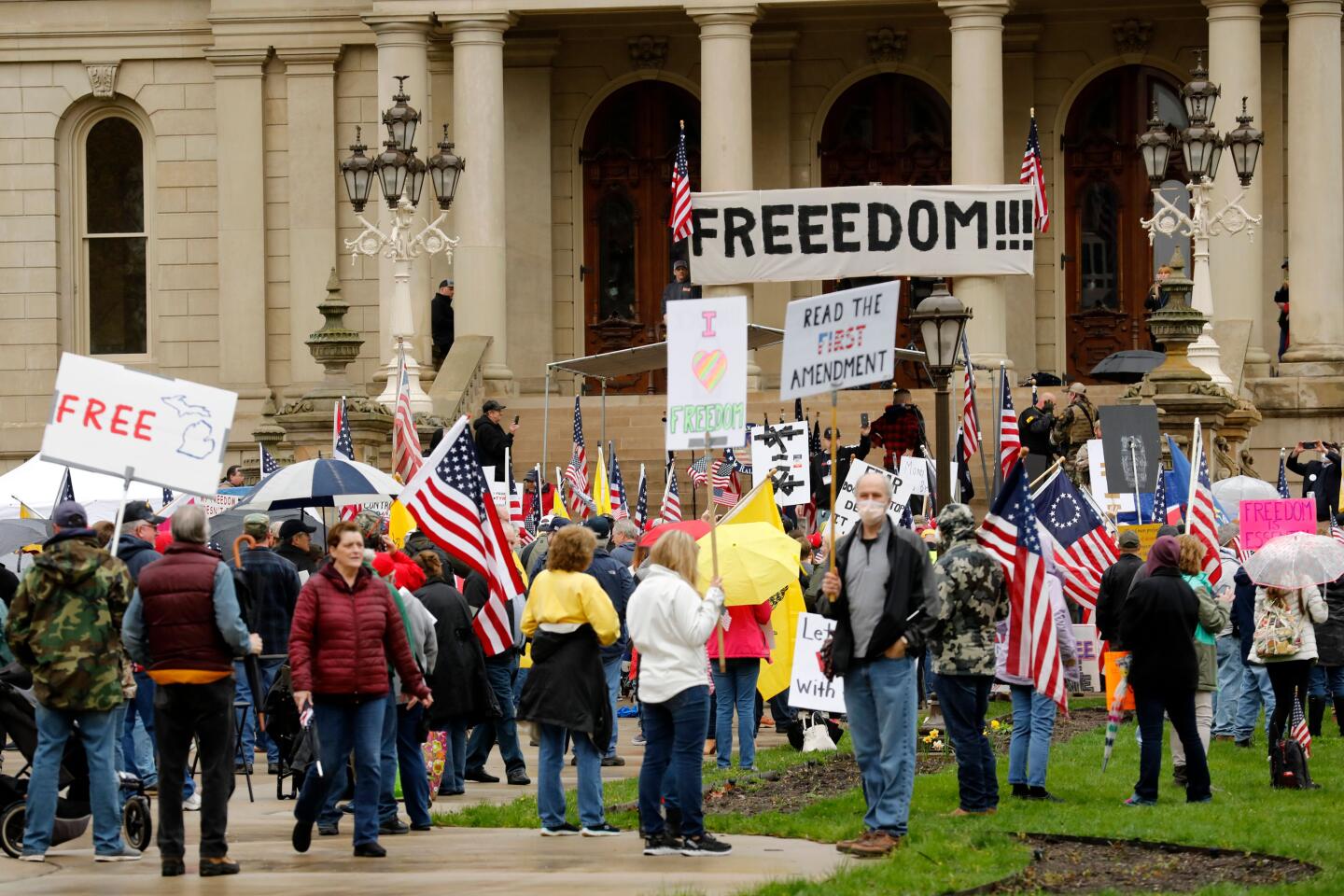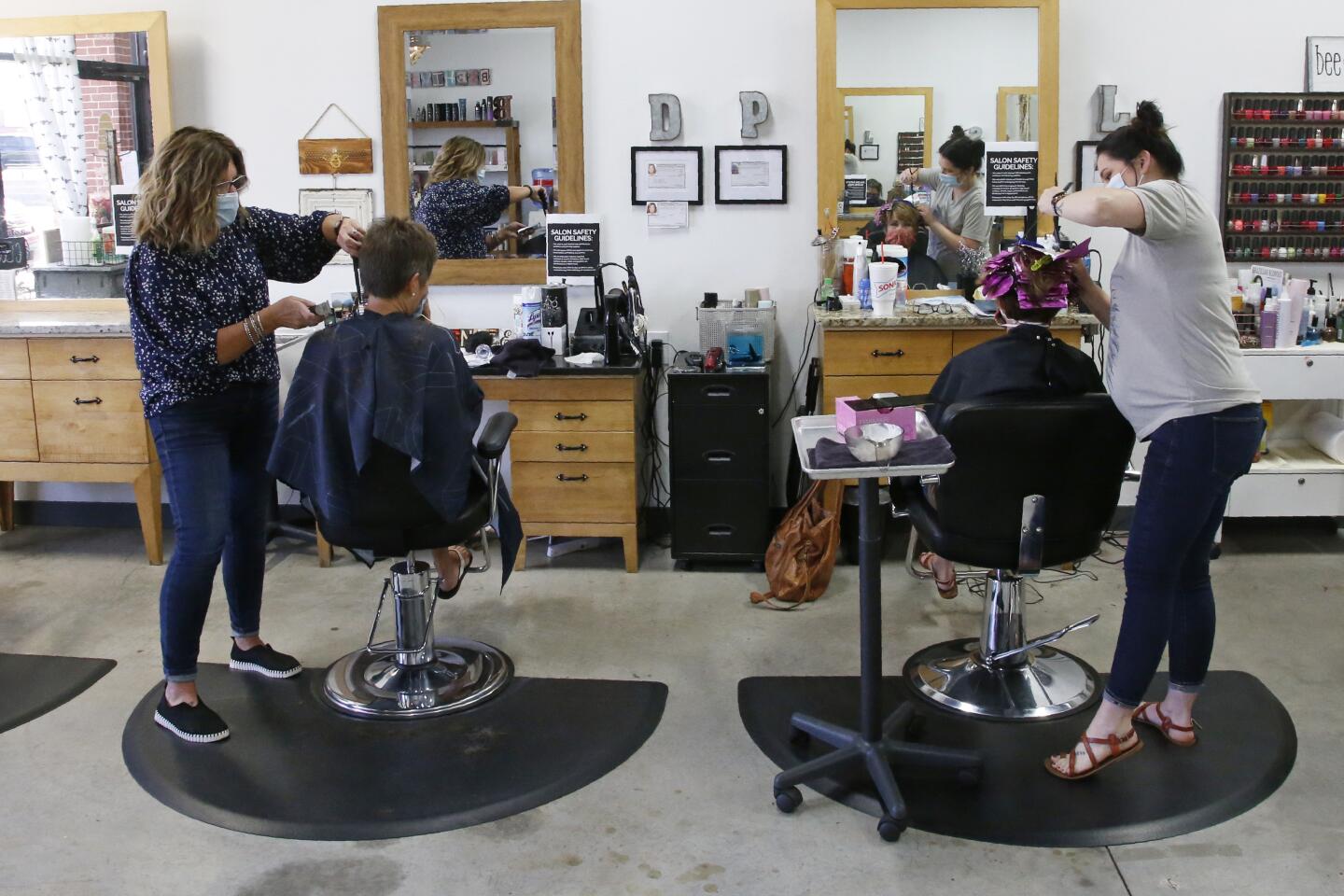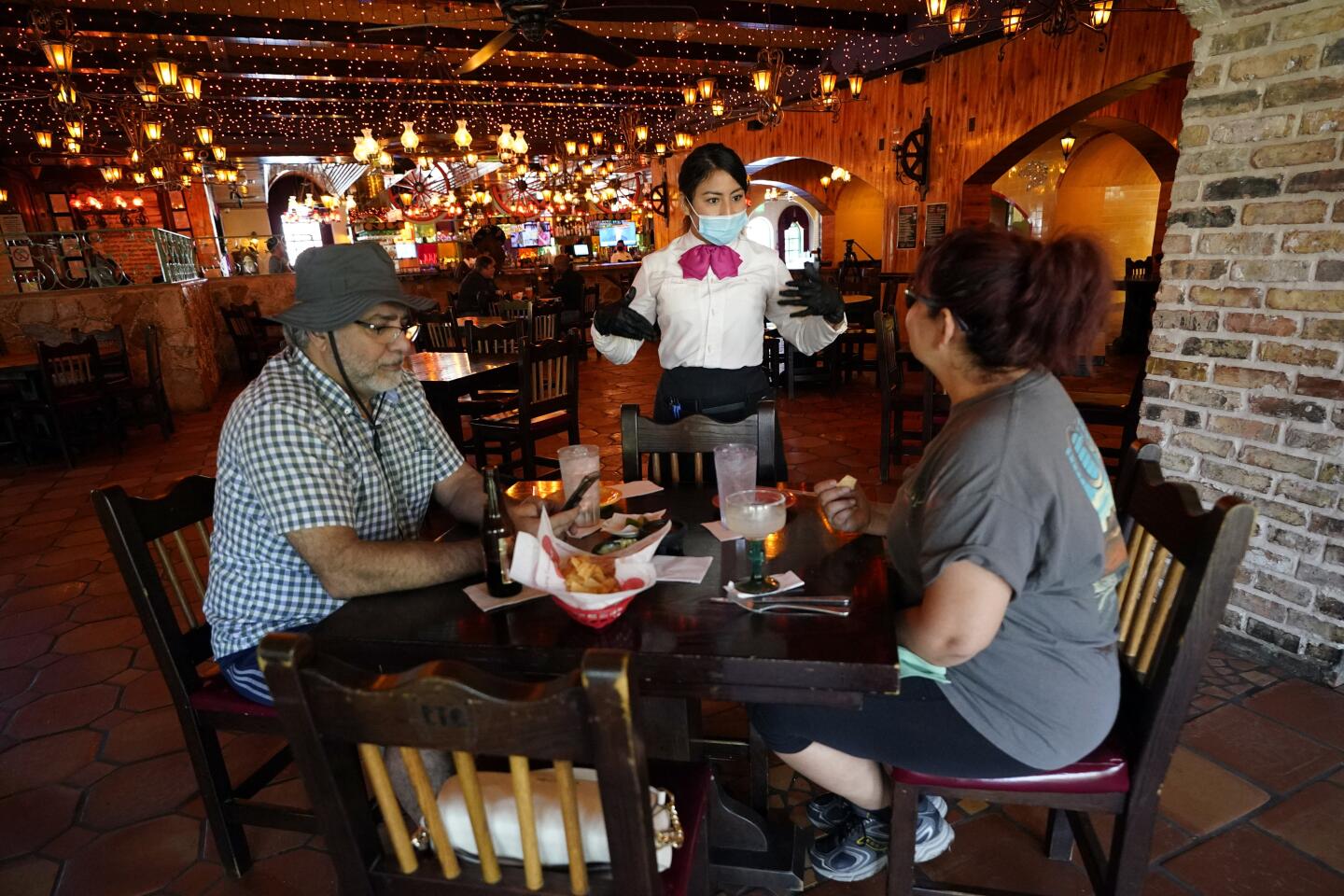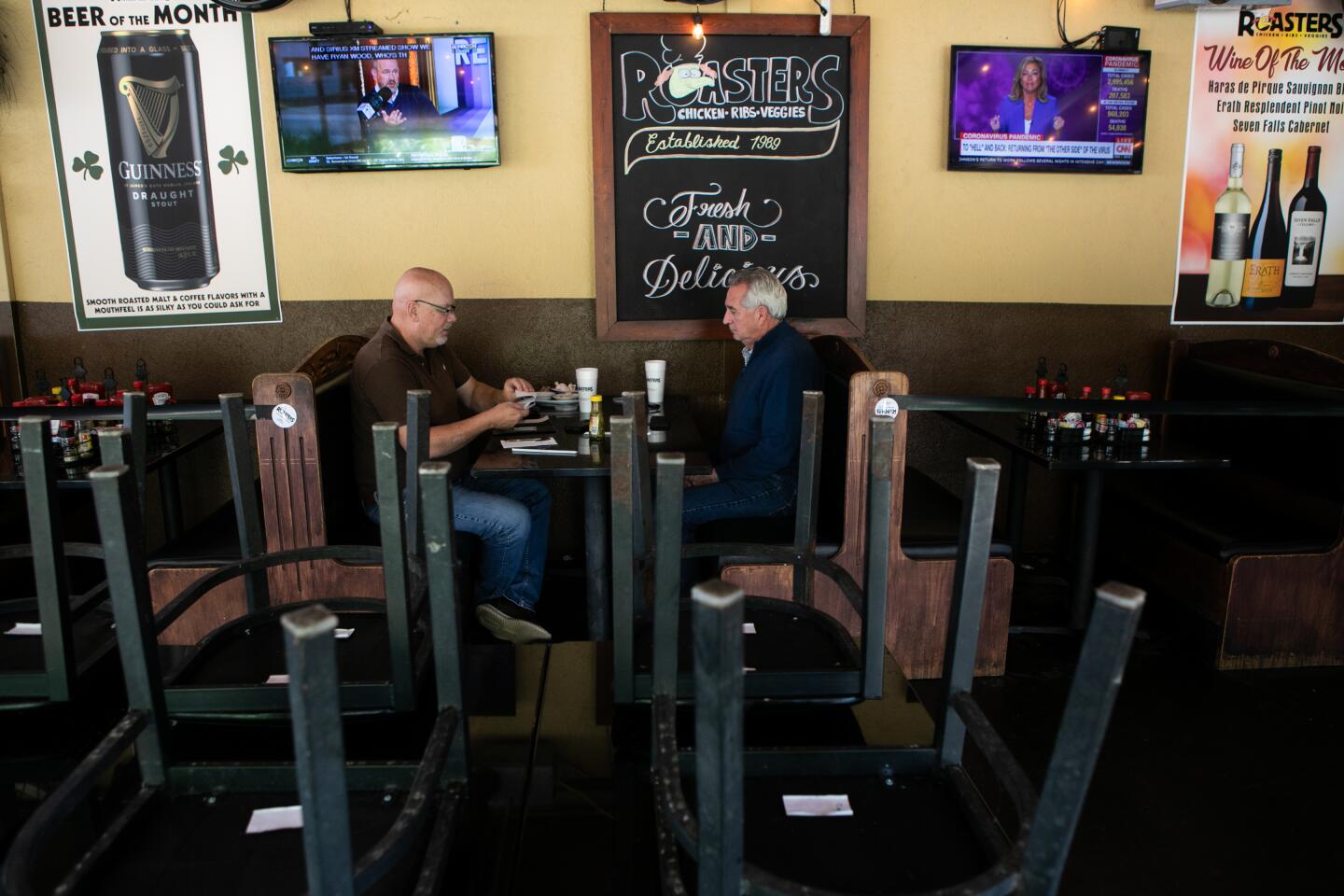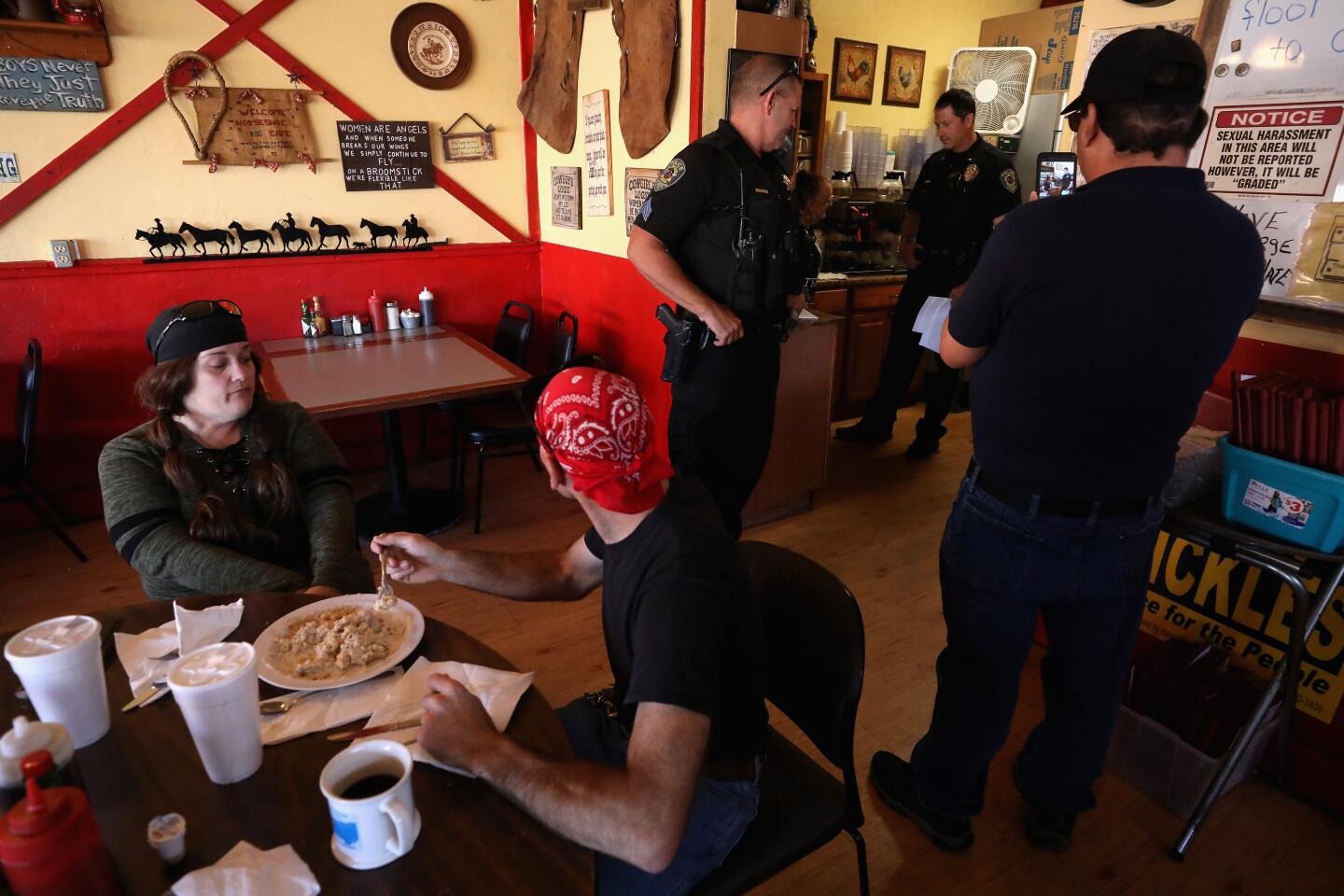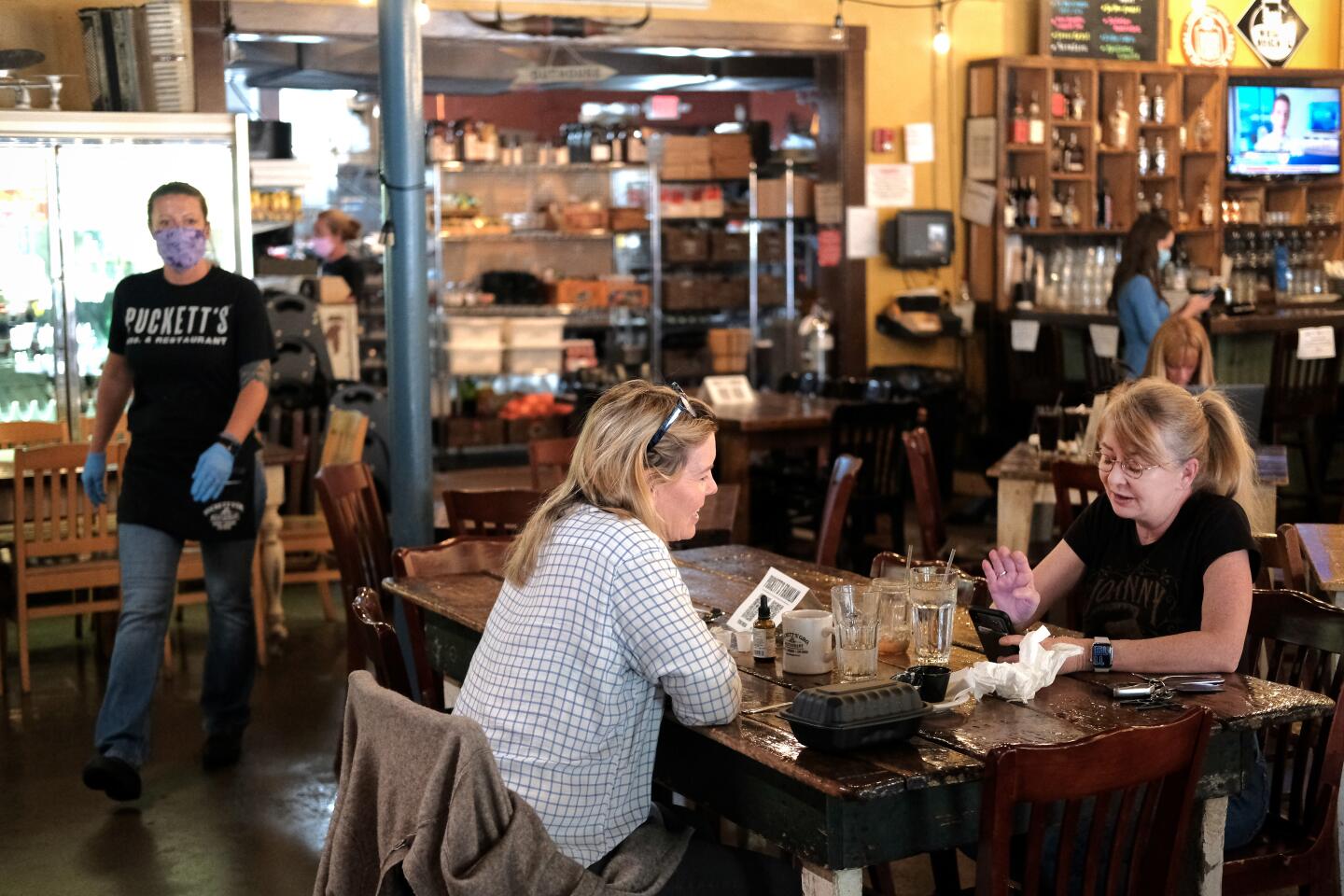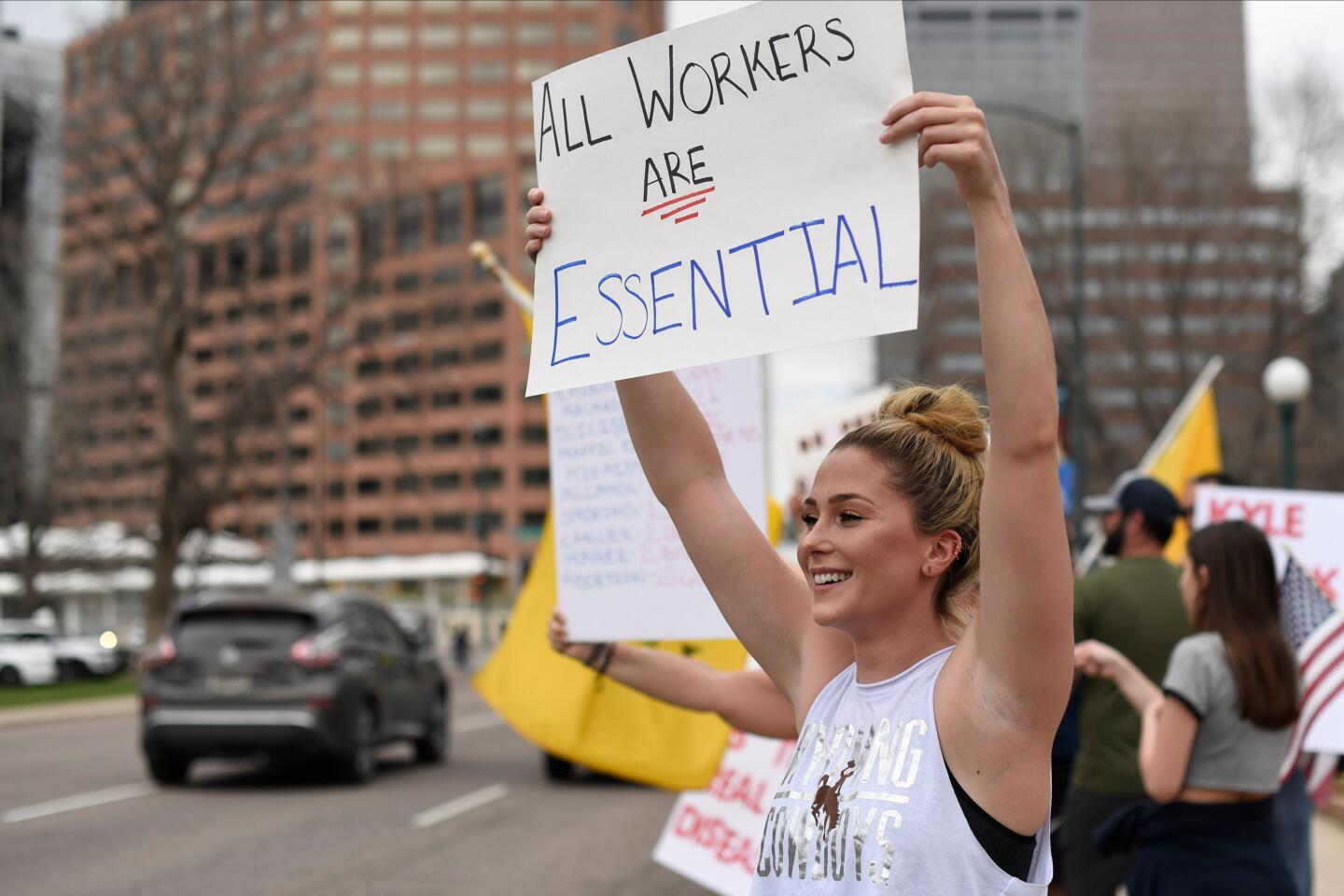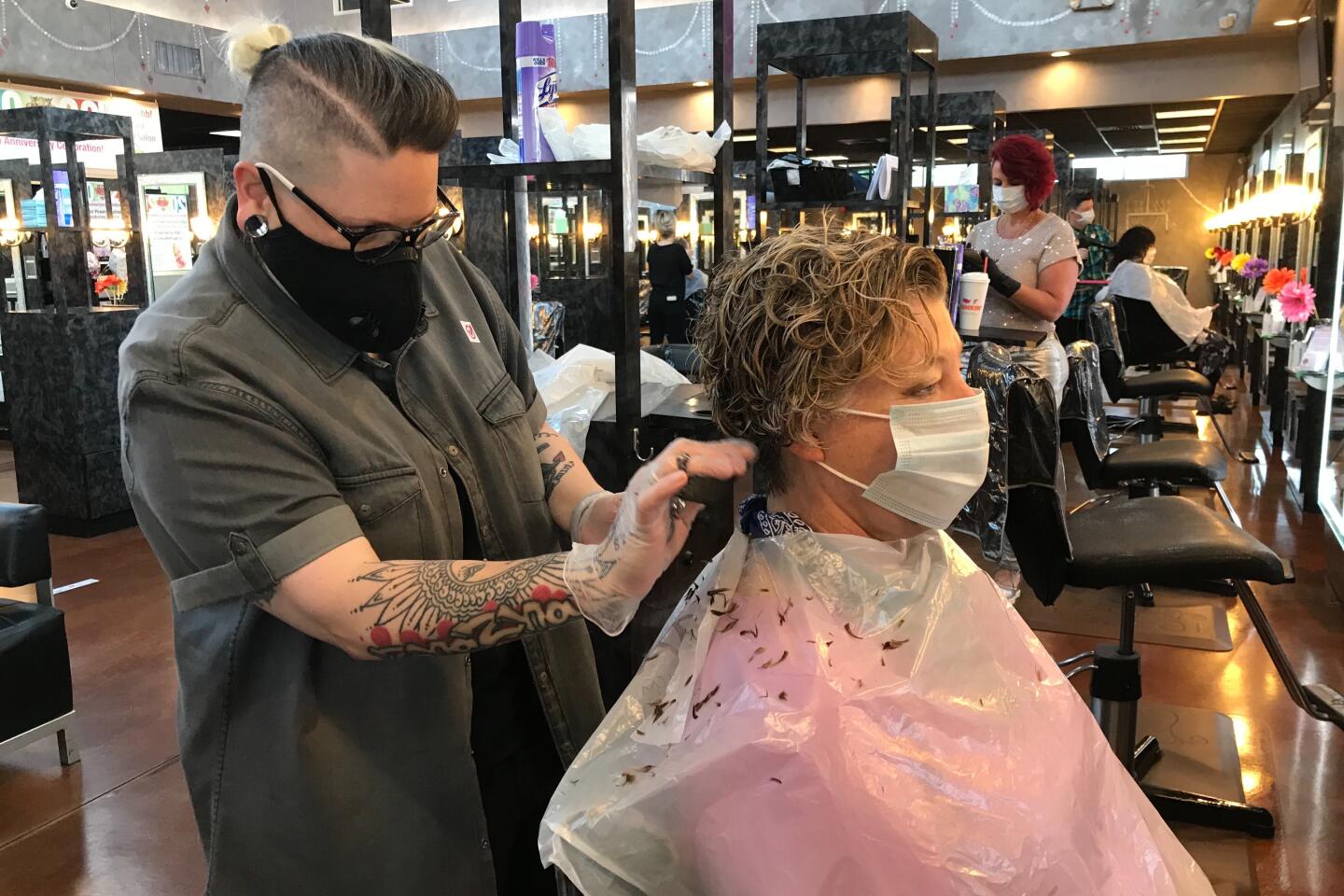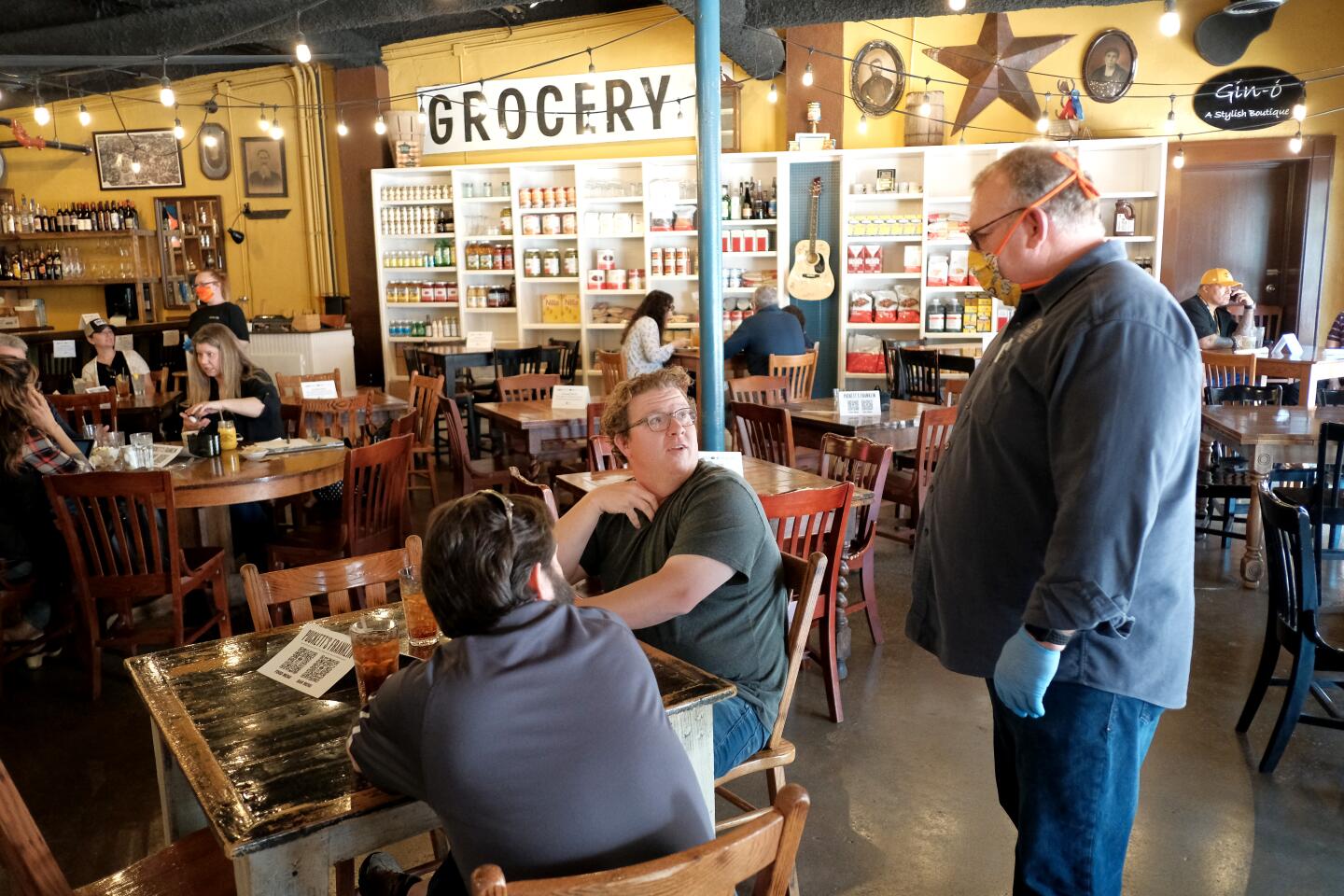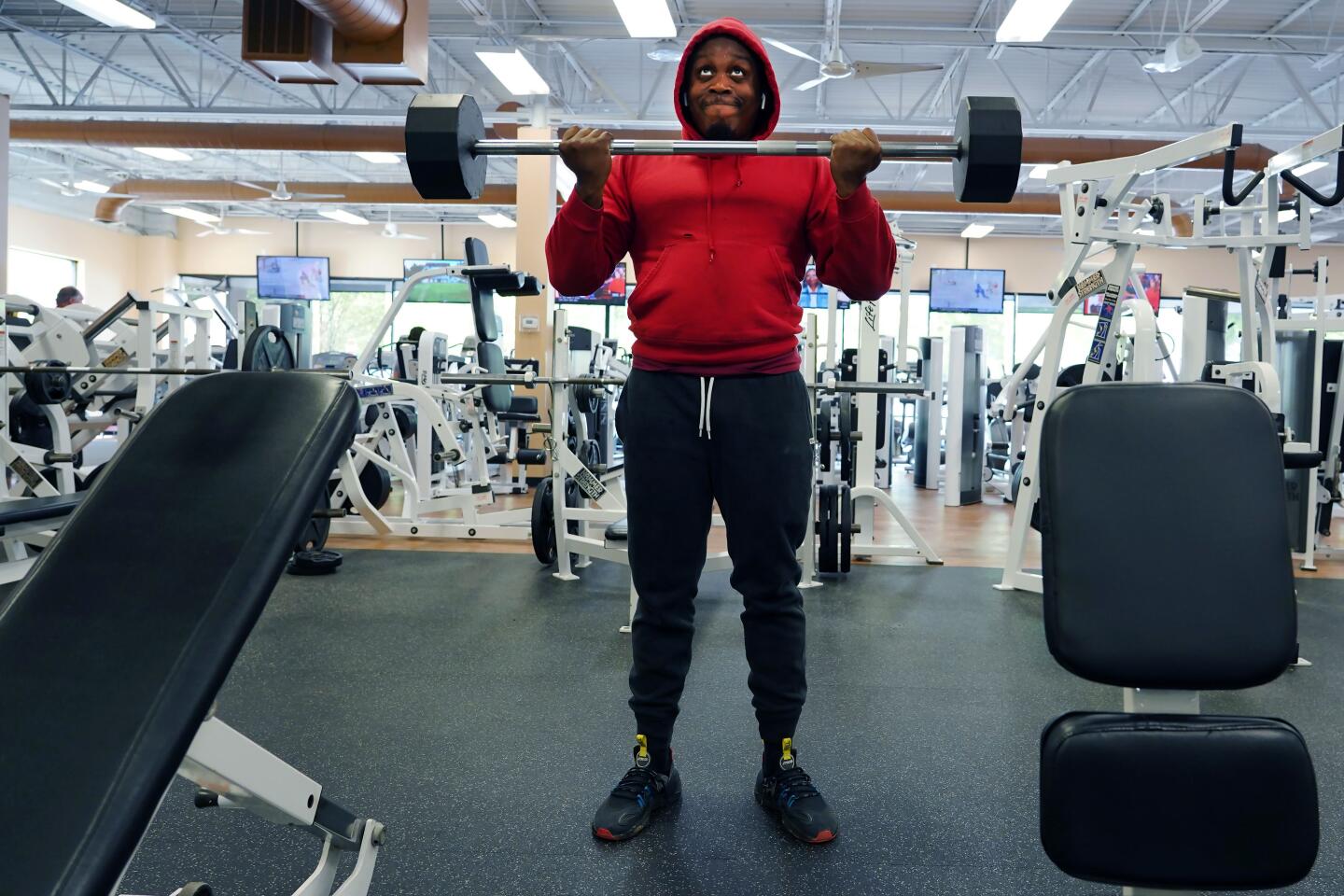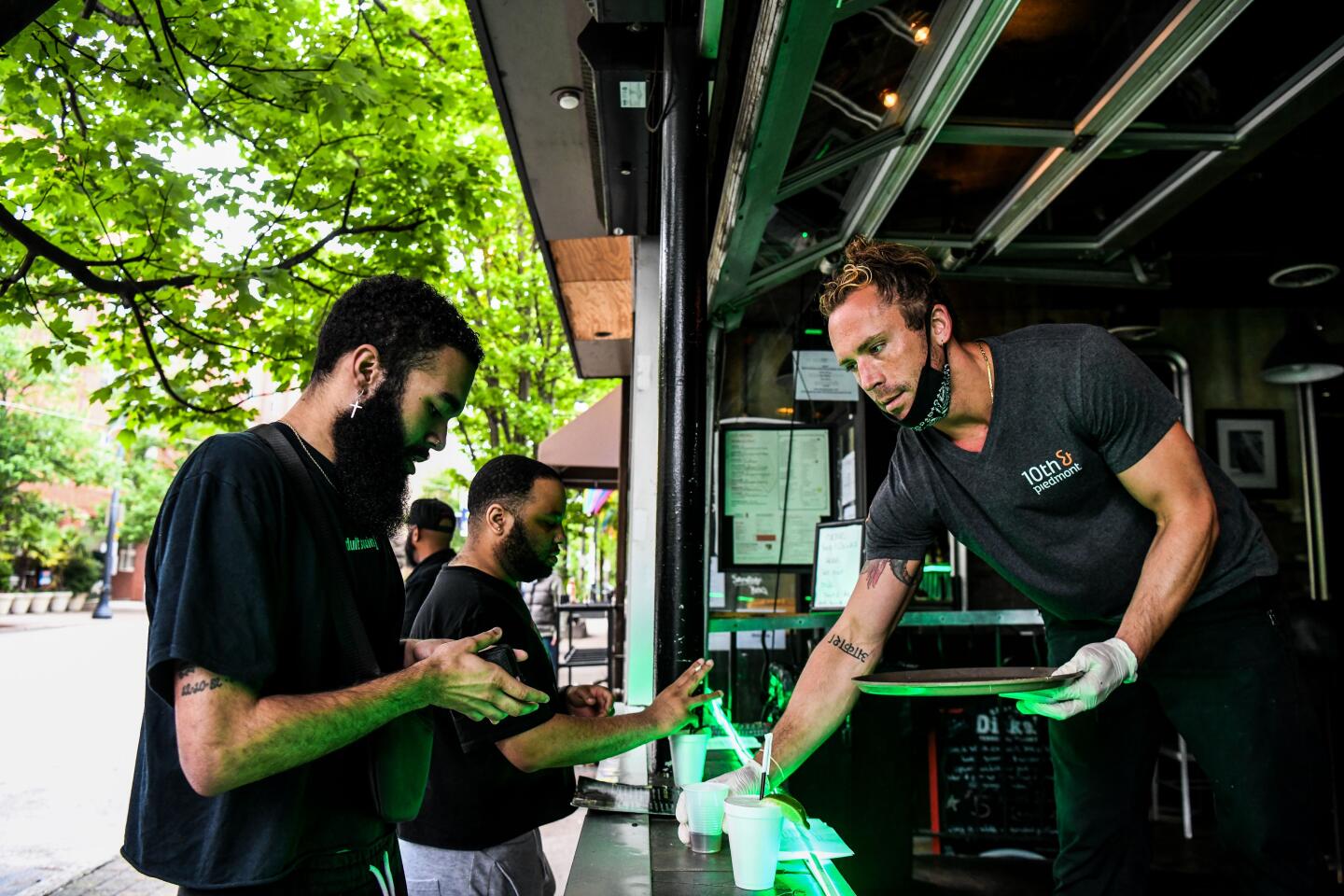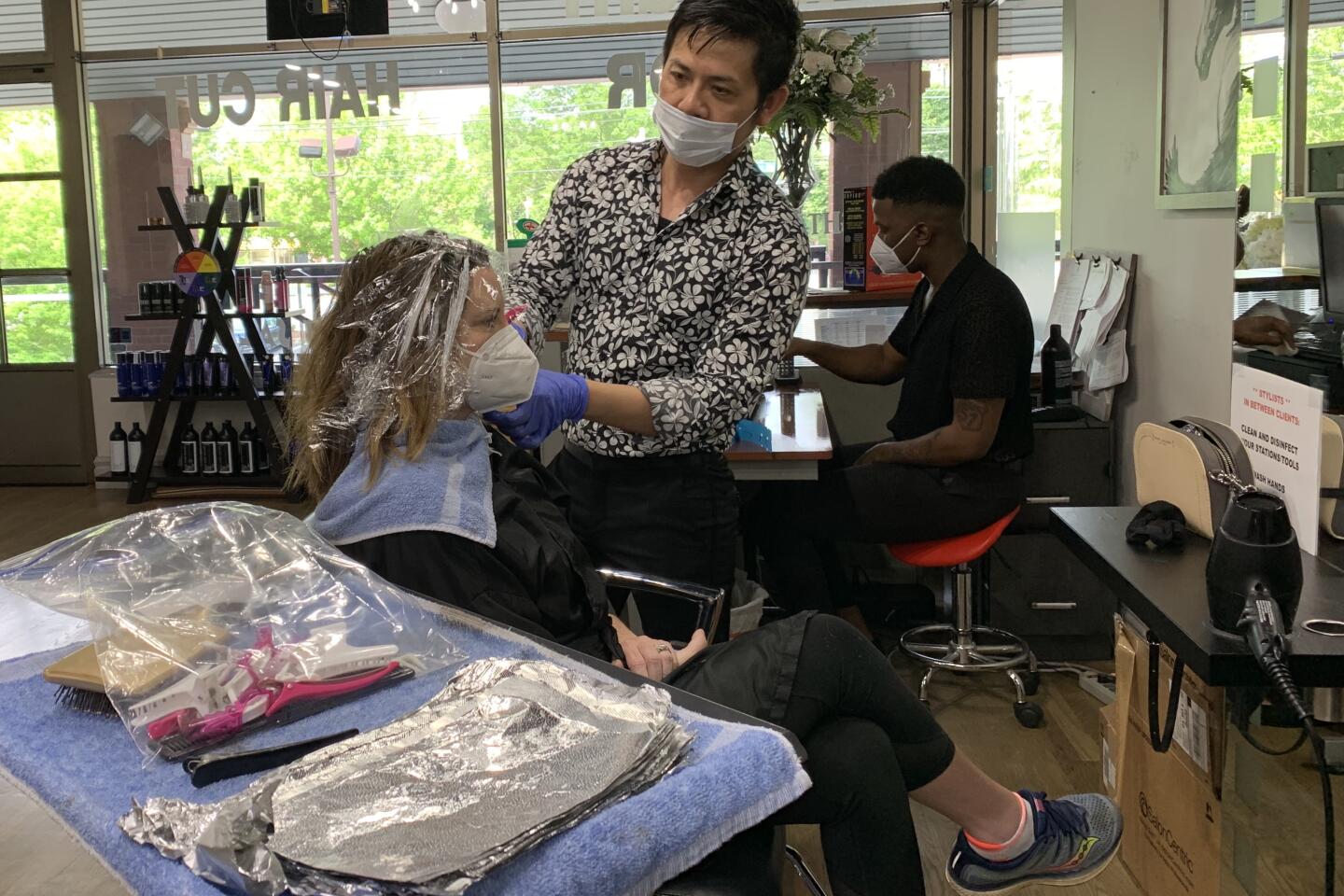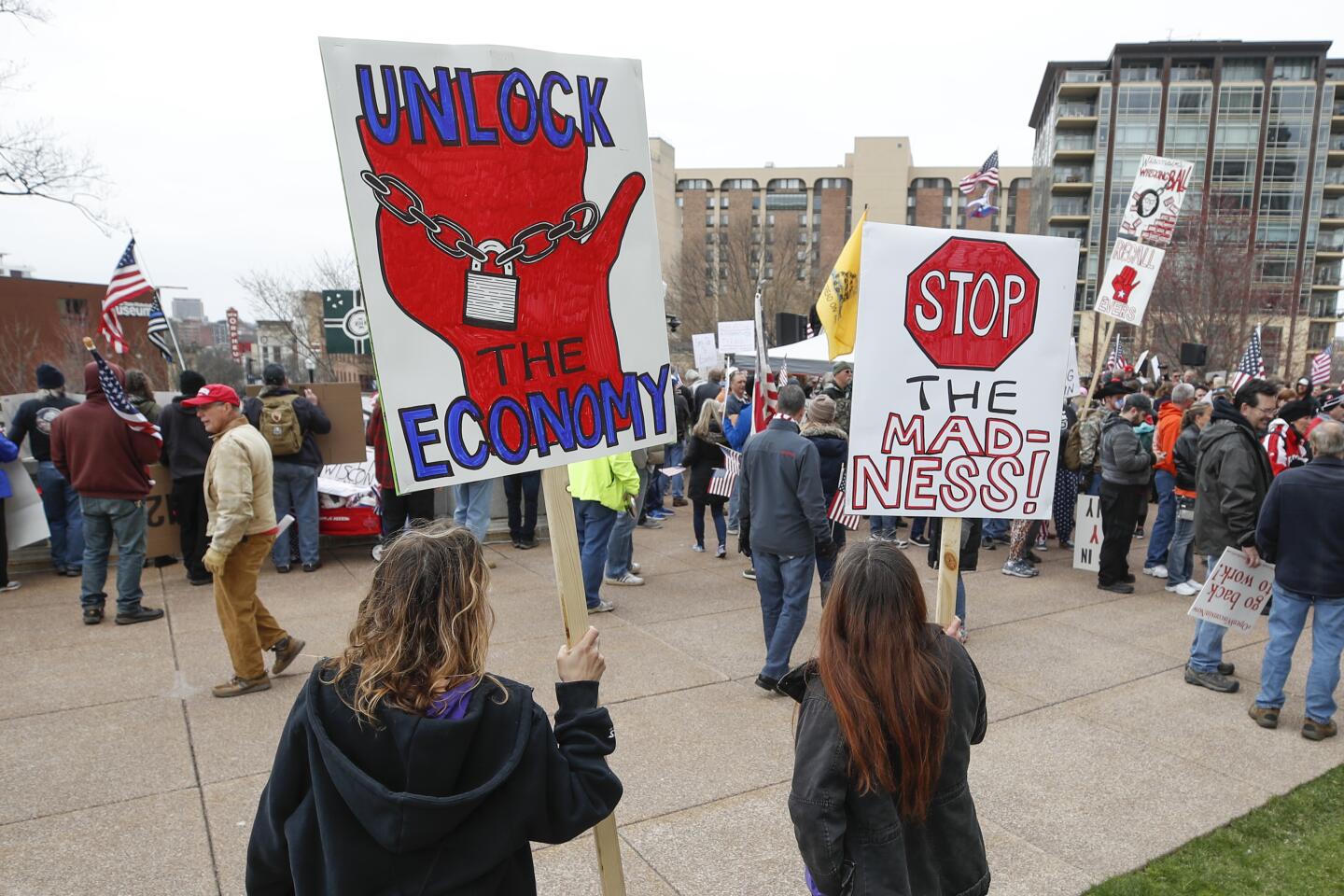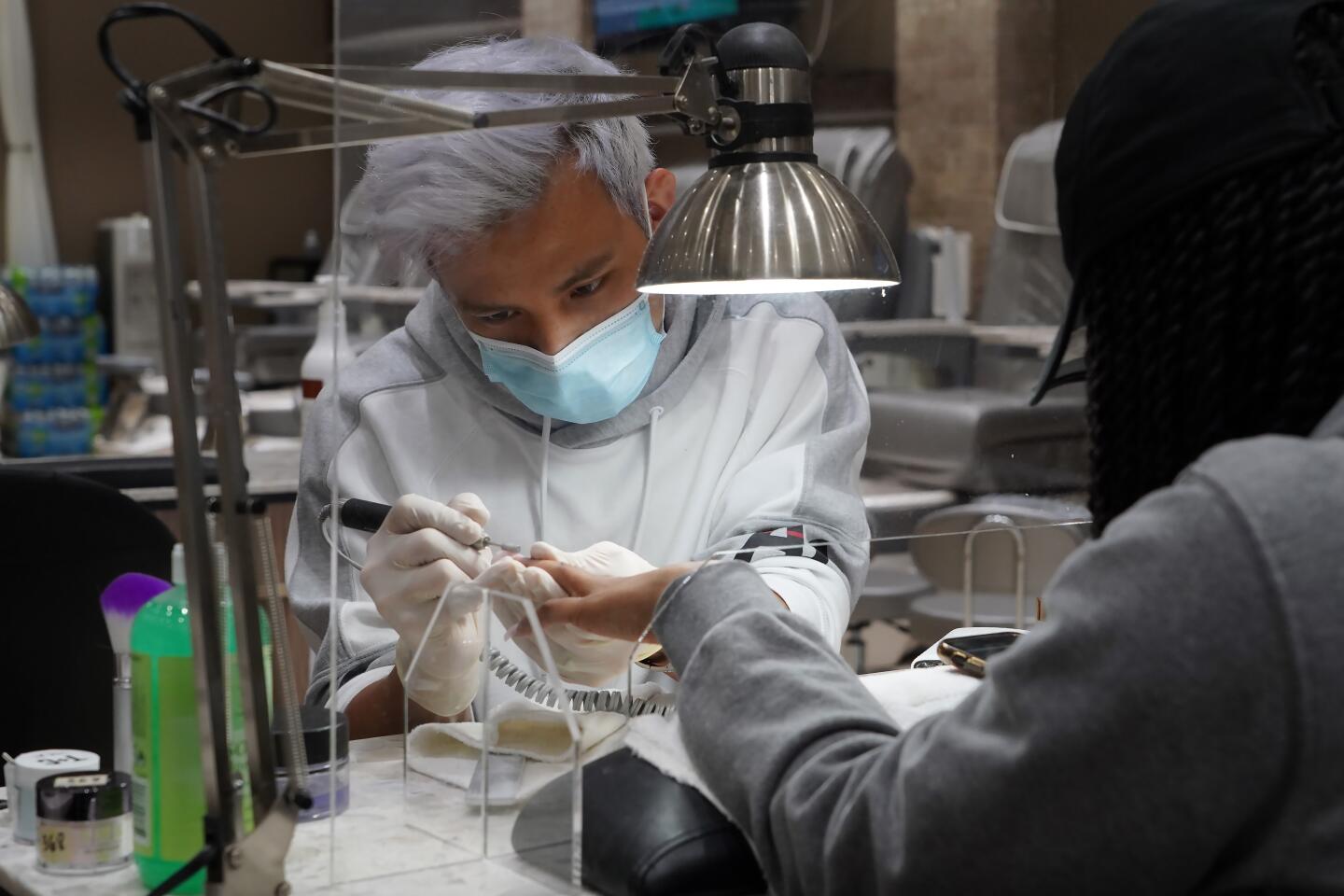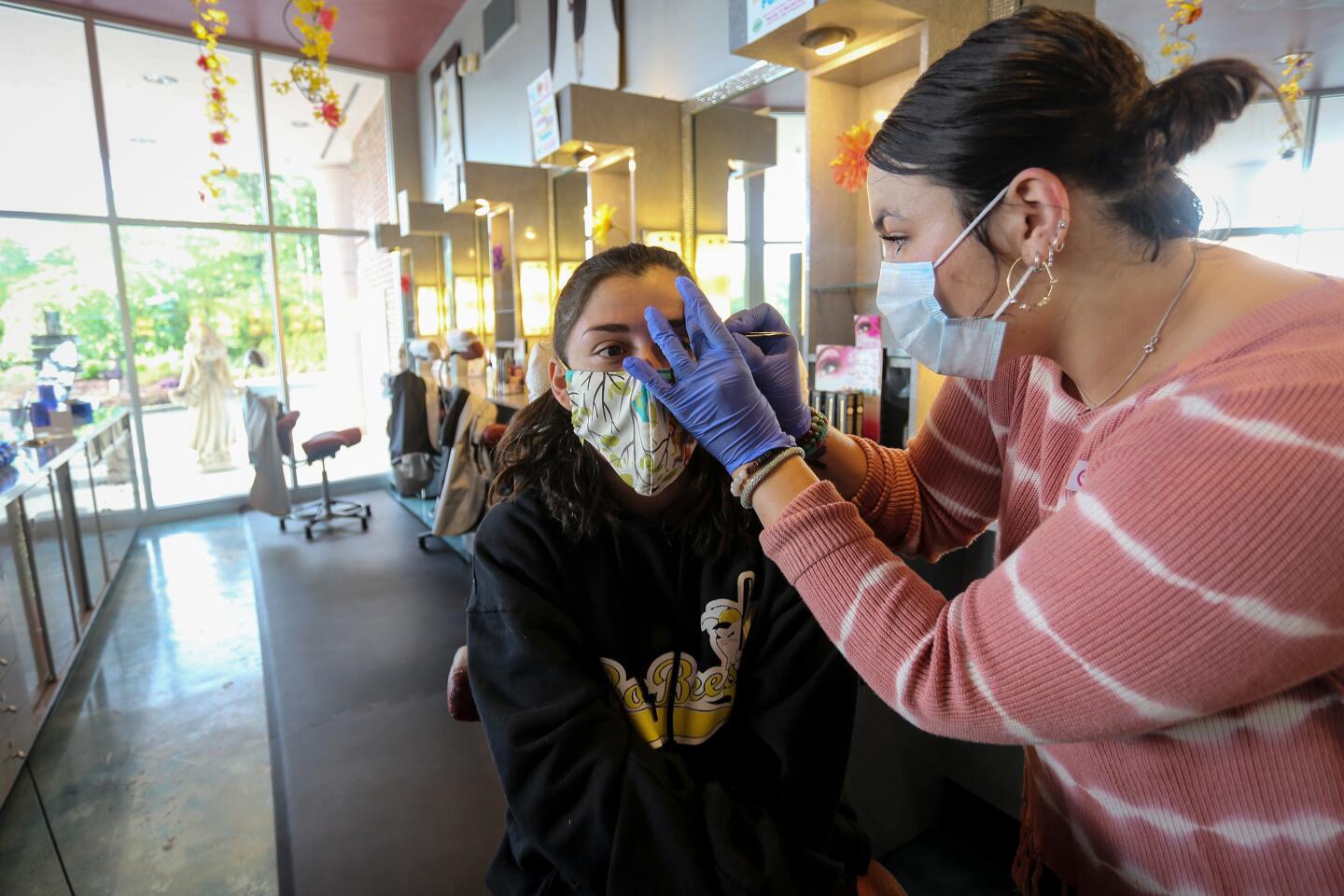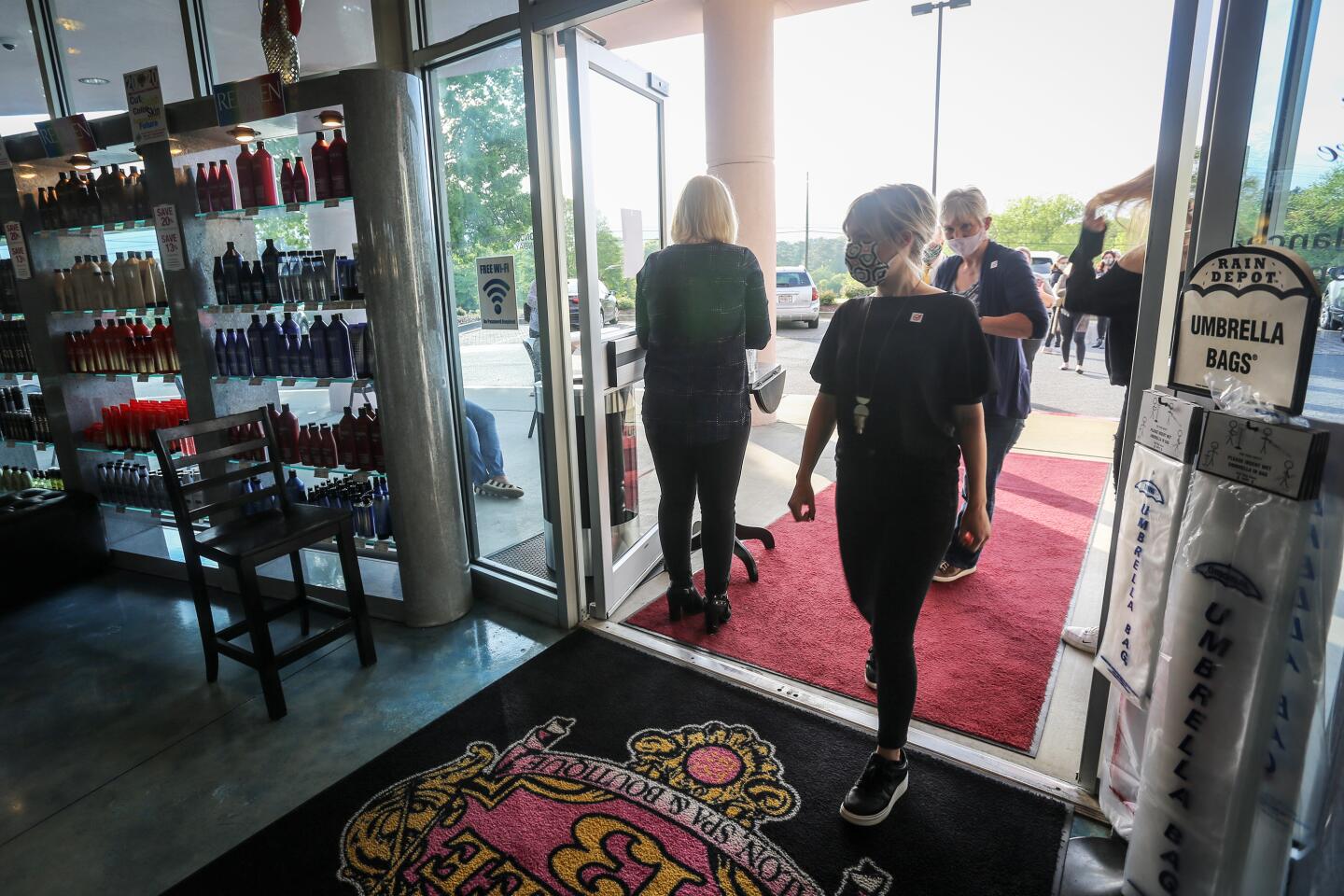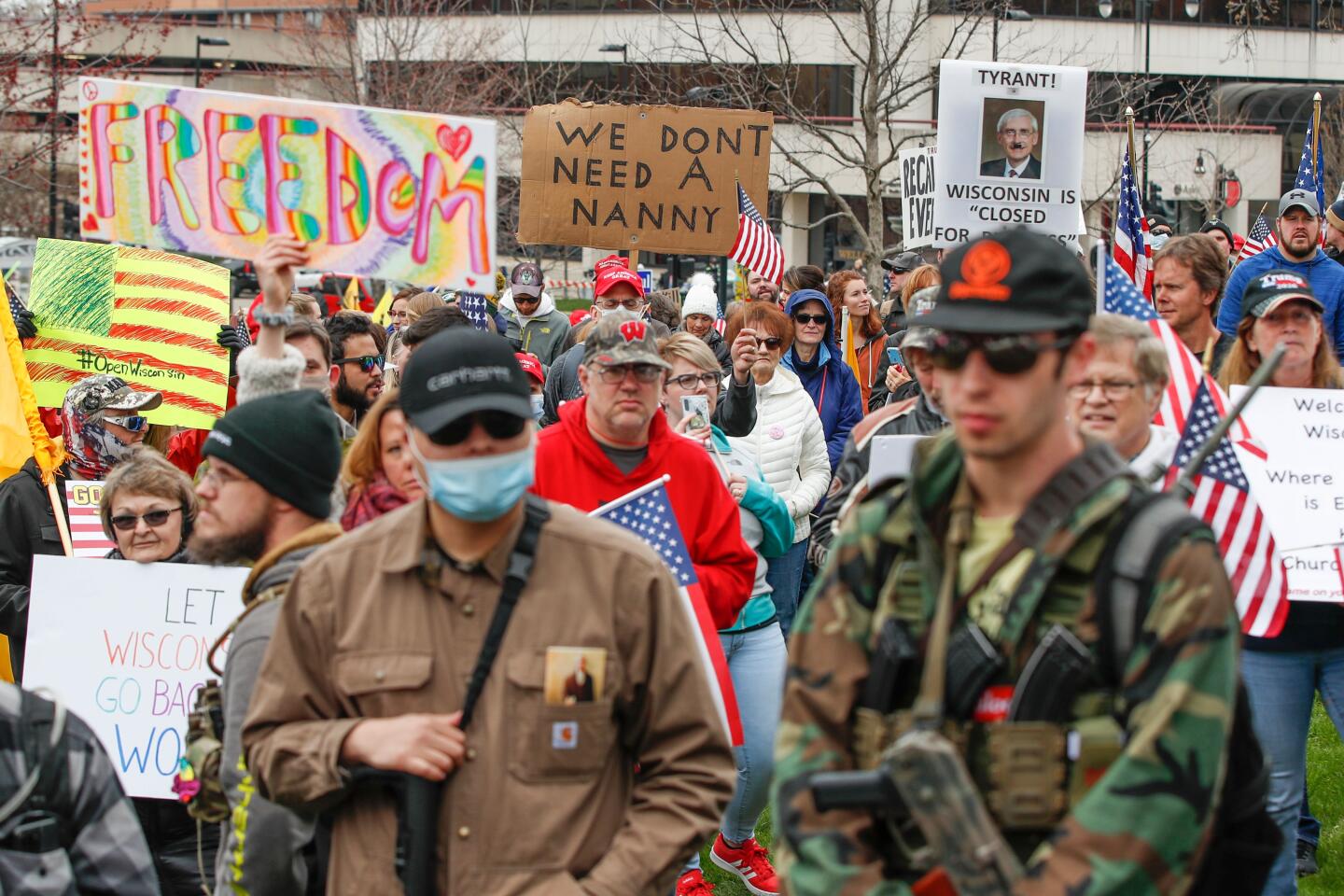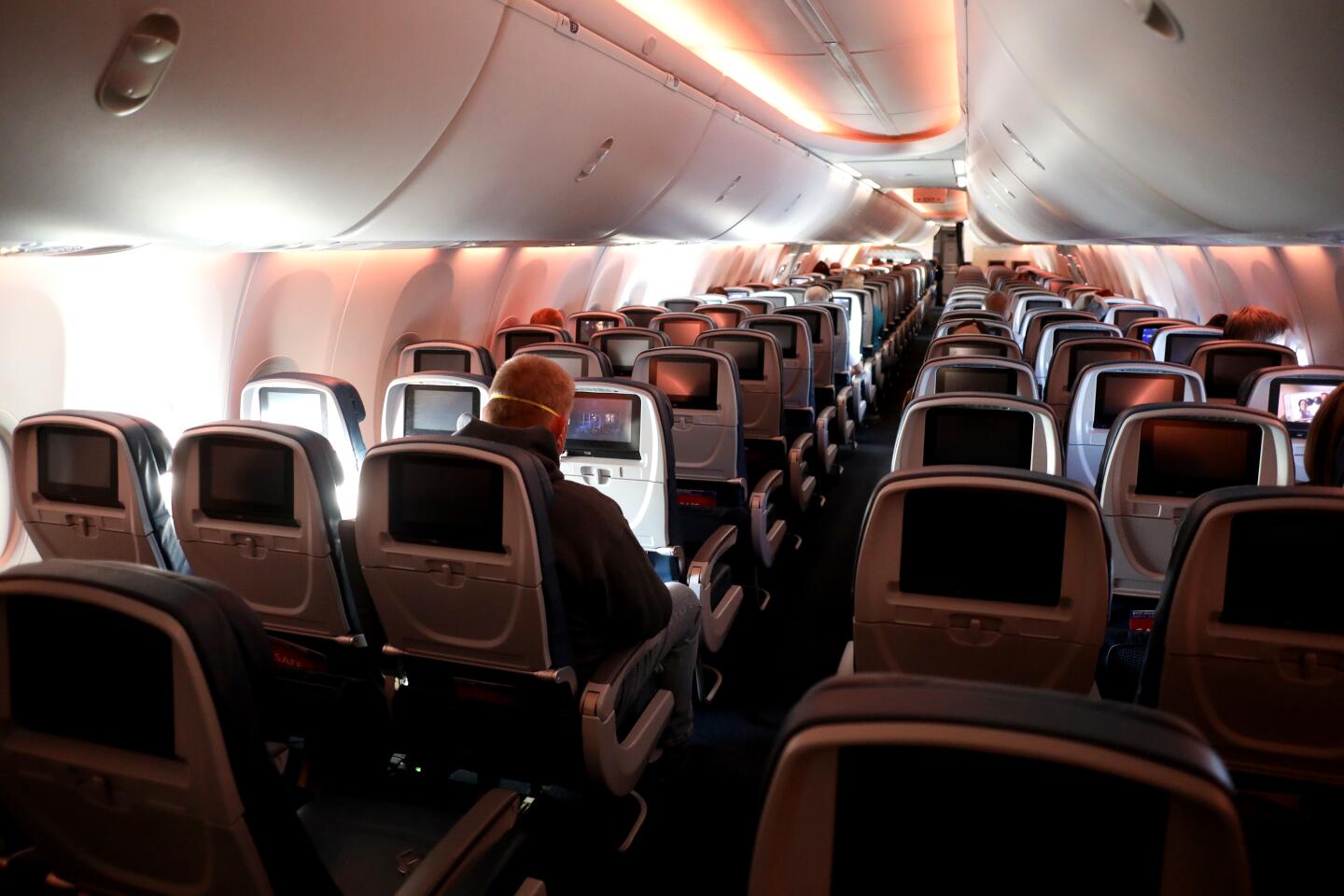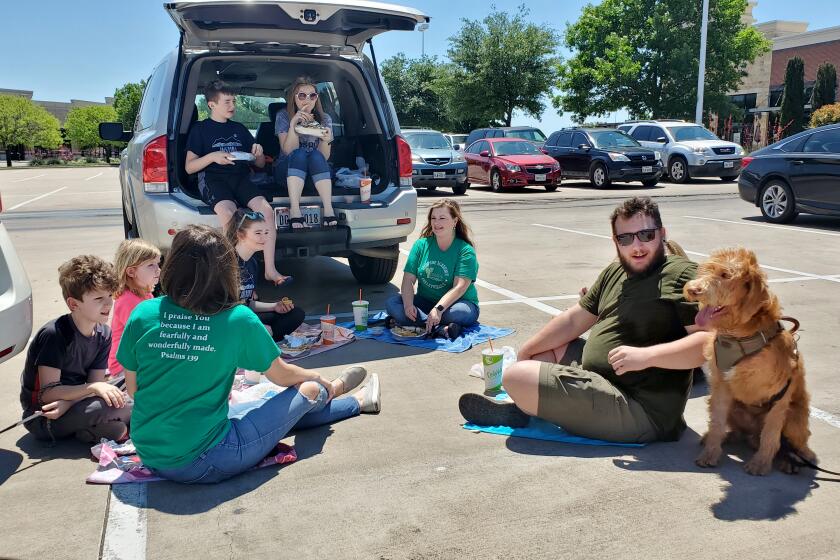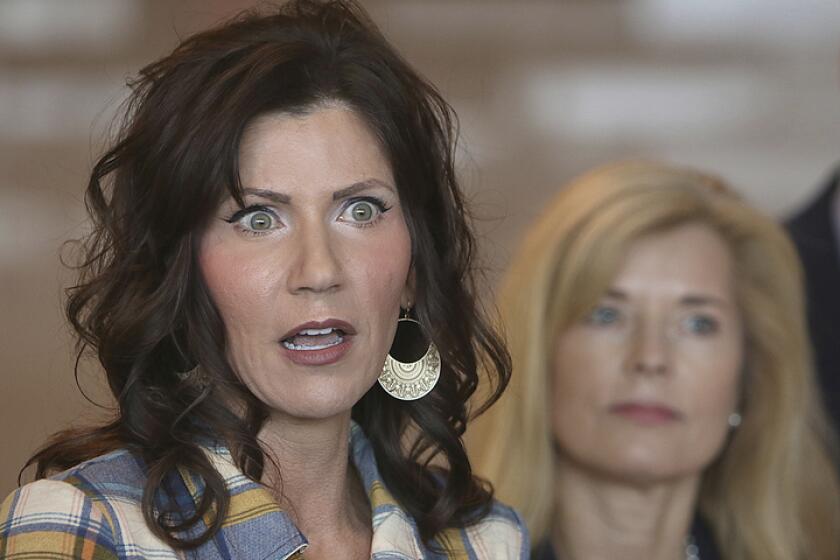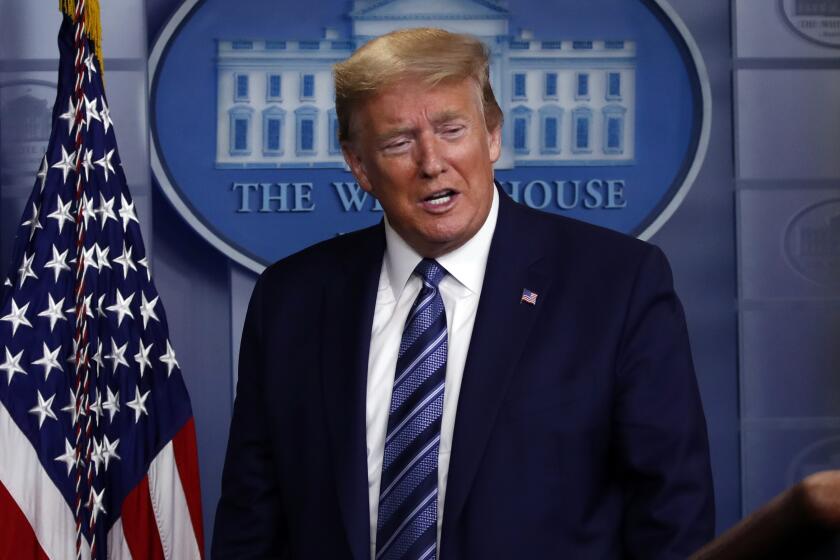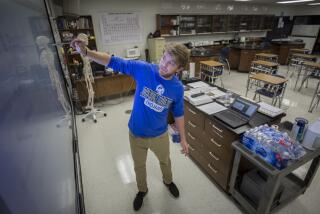Georgia reopens hair salons and gyms, offering a preview of life after lockdown
- Share via
MARIETTA, Ga. — Before 8 a.m., the women wearing masks and bandannas began to line up gingerly outside the Three-13 Salon, Spa & Boutique, taking care to keep a six-foot distance.
In the middle of a deadly viral pandemic, some needed trims and root touch-ups. Others craved pedicures, blowouts and face waxes.
Outside the double glass doors, an employee took their temperatures with an infrared thermometer, asked if they had had a cough or fever, and then handed them a small sticker with a red check mark.
As Georgia became the first state Friday to reopen a broad swath of businesses — lifting restrictions on gyms, barber shops, hair and nail salons, tattoo parlors and bowling alleys after a monthlong shutdown to halt the spread of the COVID-19 virus — the move did not exactly mark a return to normalcy.
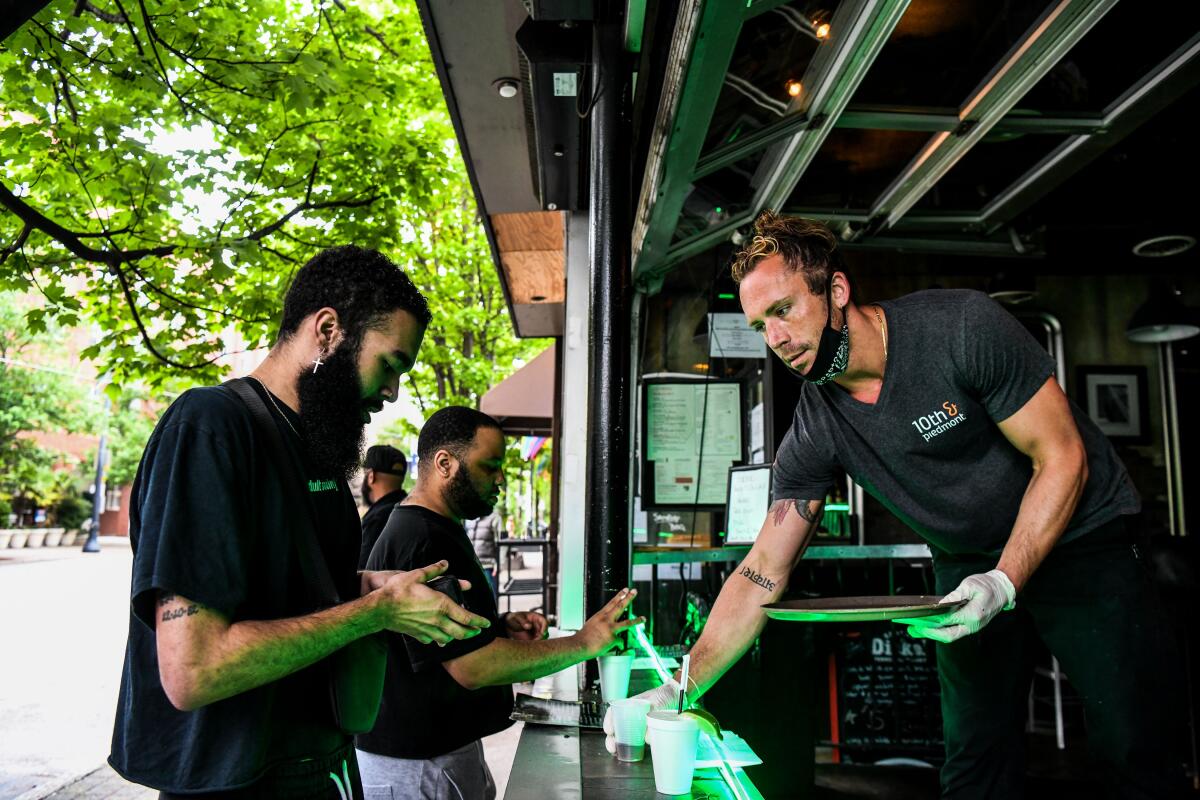
With COVID-19 still spreading across the state – its death toll had climbed by 35 on Thursday – many salons and tattoo parlors remained shut as business owners worried about the health risks of reopening. Some opened their doors to reveal scenes out of science fiction, with skeleton crews spaced six or even 12 feet apart, wearing nitrile gloves and surgical and N95 masks.
Many local officials and infectious-disease experts have warned that reopening too early without more testing could lead to a surge in new infections. Already, more than 22,000 people in Georgia have tested positive for the virus and 892 people have died since the outbreak began.
Atlanta Mayor Keisha Lance Bottoms urged people to stay home and carry on social distancing.
“Listen to the scientists,” Bottoms said Friday morning on ABC’s “Good Morning America.” “There is nothing essential about going to a bowling alley or getting a manicure in the middle of a pandemic.”
But the mood was orderly yet relaxed at Three-13, a large salon in Marietta, an affluent suburban city about 20 miles north of Atlanta.
More than half of the 85 full-time staff were back in the 13,000-square-foot space that had been sanitized and reconfigured to allow for social distancing. There was no waiting area inside, and hair-cutting stations were spaced 12 feet apart.
“This feels safer than going to the grocery store,” said Karon Gilmore, 59, senior director of operations for a large consulting company, as her regular stylist, Natascha Updegrove, ran a comb through her wet blonde hair.
“I wouldn’t call this reckless,” Updegrove said through a black face mask with a charcoal filter. “It’s almost like we’re setting the example on how to safely reopen.”
Colleyville city leaders went further than the Texas governor, allowing restaurants and salons to reopen this week. Residents remain conflicted.
After being closed for 33 days, Three-13 lost an estimated $450,000, said the salon owner Lester Crowell.
In other parts of the state, salon workers returning to work were more anxious.
“We’re all scared,” said Mariam Cisse, 46, the owner of Laze Hair Braiding in Atlanta’s historic black West End community, as she tied long ochre braids to her client Britany Granger’s hair for $180.
With her business shuttered, she had not been able to pay this month’s $3,000 rent. She did not know how long her landlord would let her delay payments. Most of her stylists had not come back to work.
“I don’t have any choice,” she said. “If the mayor doesn’t want us to work, she should provide financial assistance.”
At Inner City Cuts, two stores down, Emmanuel Jenkins, 39, slowly moved his clippers up the head of a client, Martay Fleming, who did not wear a face mask.
“I don’t live in fear,” said Fleming, a 36-year-old warehouse worker.
“I agree with the mayor,” Jenkins said matter of factly as he shaved a temp fade. “But I got a family to feed.”
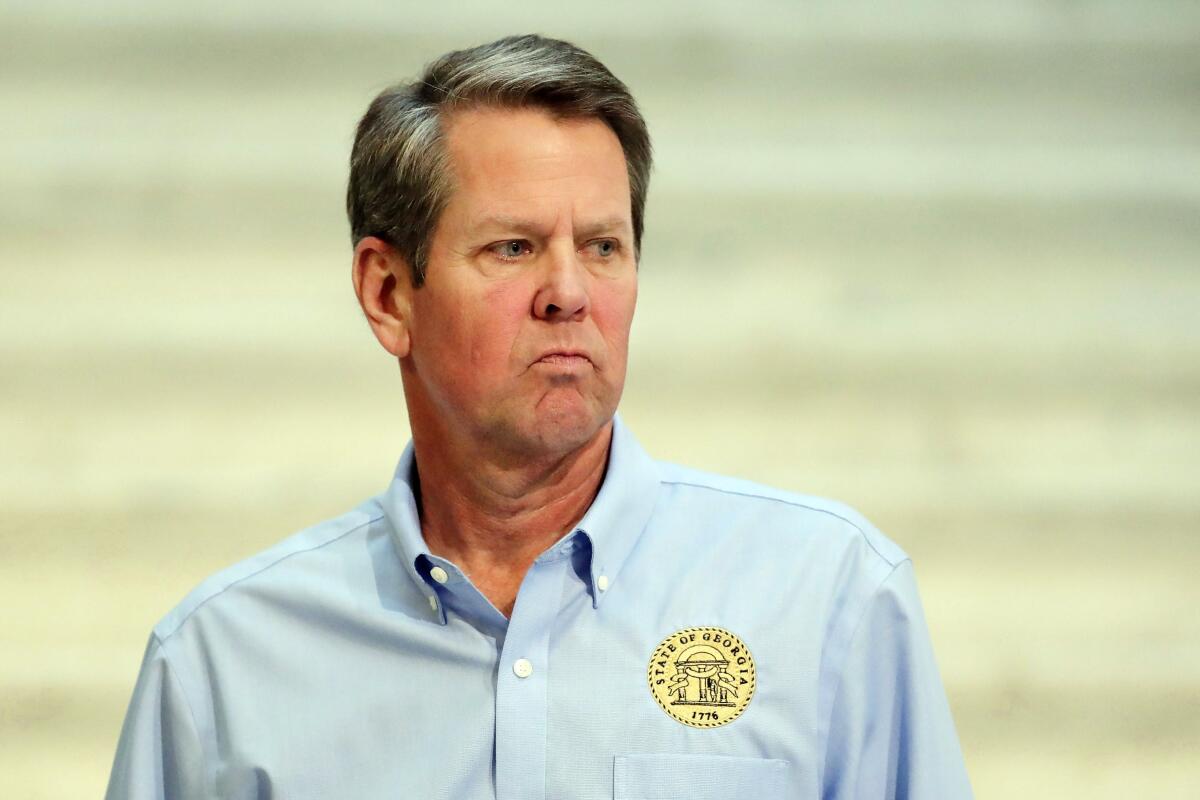
Condemned as risky and premature by Democratic mayors in the big urban hubs of Atlanta, Augusta and Savannah, Republican Gov. Brian Kemp’s plan received surprising opposition this week from President Trump, who has long expressed eagerness to kickstart the economy and encouraged states to reopen.
“I told the governor of Georgia, Brian Kemp, that I disagree — strongly — with his decision to open certain facilities,” Trump said Wednesday in a White House briefing. “It’s just too soon.”
Much of Atlanta remained a ghost town Friday, with salons, tattoo parlors and gyms in many neighborhoods remaining closed.
Republican governors of eight states have not issued stay-at-home orders, even as coronavirus outbreaks spread at factories, long-term care facilities and prisons.
Patrick Cochran and Blair Smoker, a husband and wife team who co-own Pair Studio in the leafy Grant Park neighborhood, decided pretty soon after Gov. Kemp’s announcement that it was not time to reopen.
“No way,” Cochran said. “If I’m cutting somebody’s bangs, I’m right in their face.”
Cochran and Smoker have gotten by so far, earning about a quarter of their regular income by selling gift cards and delivering root touch-up sprays and hand balms.
While they have been forced to defer their car payments, they felt lucky compared with other hairdressers who were falling behind on mortgages and facing financial ruin. They had some savings and their studio’s landlord was not making them pay rent until the second week of May.
Watching the debate around reopening get heated on social media — with some condemning businesses that reopened and threatening not to ever spend money with them again — Cochran felt uncomfortable.
“Can we all agree to refrain from public shaming those who freely choose to return to work?” he posted Thursday on Facebook. “People keep saying we’re all in the same boat. This isn’t quite true. We are all in the same storm, but we are in different boats.”
A flurry of states have moved to end lockdowns. South Carolina has already allowed department stores, flea markets, florists and beaches to reopen. Oklahoma is letting hair salons, pet grooming studios, tattoo shops and state parks to reopen Friday. Tennessee Gov. Bill Lee has said the “vast majority” of businesses and services can reopen May 1.
States continue to act to ease stay-at-home orders amid the pandemic. Some cities resist, saying it’s too early to let down their guard against the coronavirus.
The White House’s Guidelines for Opening Up America Again recommend that states do not reopen until they see a decline in influenza-like illnesses reported and documented COVID-19 cases for a 14-day period.
Georgia does not yet meet that criteria, yet many Georgians were eager to reopen.
“It’s time,” said Deborah Deavers, 63, owner of Hair By The Square in downtown Marietta. “We’ve got to go on with life. If we don’t, we’re going to lose our country.”
Salons and businesses should never have been forced to shut down, Deavers said. Instead, everyone should have carried on with life, wearing masks and gloves.
Under the new rules, businesses that reopen must follow strict sanitation and social-distancing protocol. The Georgia State Board of Cosmetologists and Barbers issued a four-page list of safety guidelines this week that recommend salons perform temperature checks of all employees and clients, limit the number of people inside and practice social distancing. All employees must wear a face mask at all times and are recommended to wear gloves and smock. All clients should wear a face mask, the guidelines say, “to the extent possible while receiving services.”
Kemp’s decision to reopen Georgia is driven chiefly by economic concerns. About 1.1 million Georgians have filed for unemployment in the last month, and many small-business owners complain the shutdown could force them to close for good.
According to the Tax Foundation, a think tank in Washington, D.C., about 16.5% of Georgia’s workforce has claimed unemployment and its state funds can cover only about eight weeks more of unemployment claims.
But the Georgia Department of Labor said it was not running out of funds.
“We have over $2 billion in our trust fund right now, and we’re doing OK,” said Kersha Cartwright, a spokeswoman for the department. “This can’t last forever, but of course, no one wants it to. We’re working really hard to get Georgians back to work safely.”
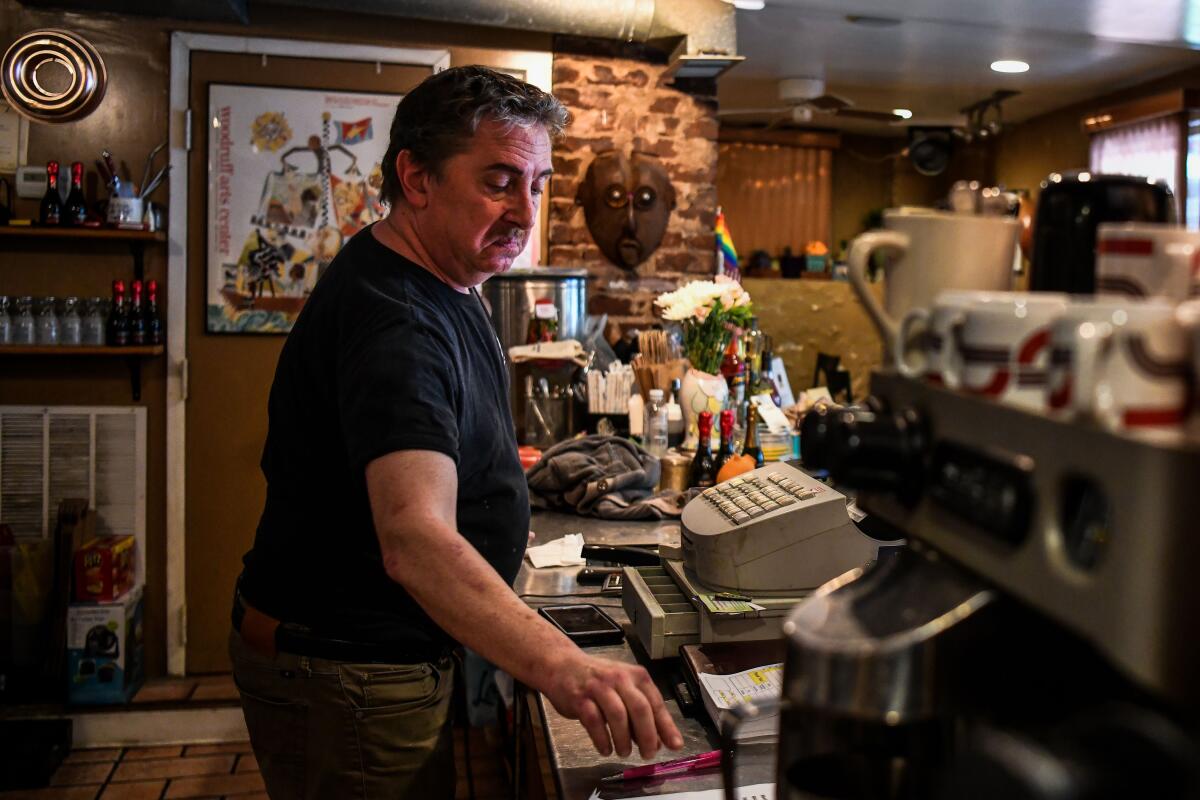
People who felt unsafe returning to the workplace, Cartwright said, would not necessarily continue to receive unemployment benefits.
“There’s a big list of potential reasons you could possibly be eligible for unemployment,” she said. “If you are caring for someone in a high-risk category, if you are immuno-compromised, if you have been diagnosed with COVID or living with a family member who’s been diagnosed with COVID. … But if you just feel unsafe returning to the workplace, that by itself would not be a valid reason.”
In Douglasville, a city about 20 miles west of Atlanta, Camilla Terrell, 52, did not think it was safe to reopen En’Vision Hair & Nail Salon.
She could not find face shields or digital thermometers for her stylists. If they worked without them, she worried they risked contracting the virus or losing their licenses.
“I need to go back to work, but this is just too dangerous,” she said. “Logically, I just cannot wrap my brain about what’s going on. Is it because the state doesn’t want to pay unemployment to a certain group of people?”
Unable to scrape together her monthly $3,690 rent for her salon, Terrell did not know how long she could continue to not work.
Sobbing, she contemplated the loss of her 14-year-old business.
“If I have to walk away, I have to walk away.”
But on Friday morning, she checked her bank account on her cellphone. A small business loan of $9,000 had finally come through.
“Praise the Lord,” she said as she dropped off the money to her landlord.
A weight had been lifted. Now she could put her mind to figuring out how she and her stylists could remain healthy and safe.
“What does that even look like in our industry?” she said.
More to Read
Sign up for Essential California
The most important California stories and recommendations in your inbox every morning.
You may occasionally receive promotional content from the Los Angeles Times.
